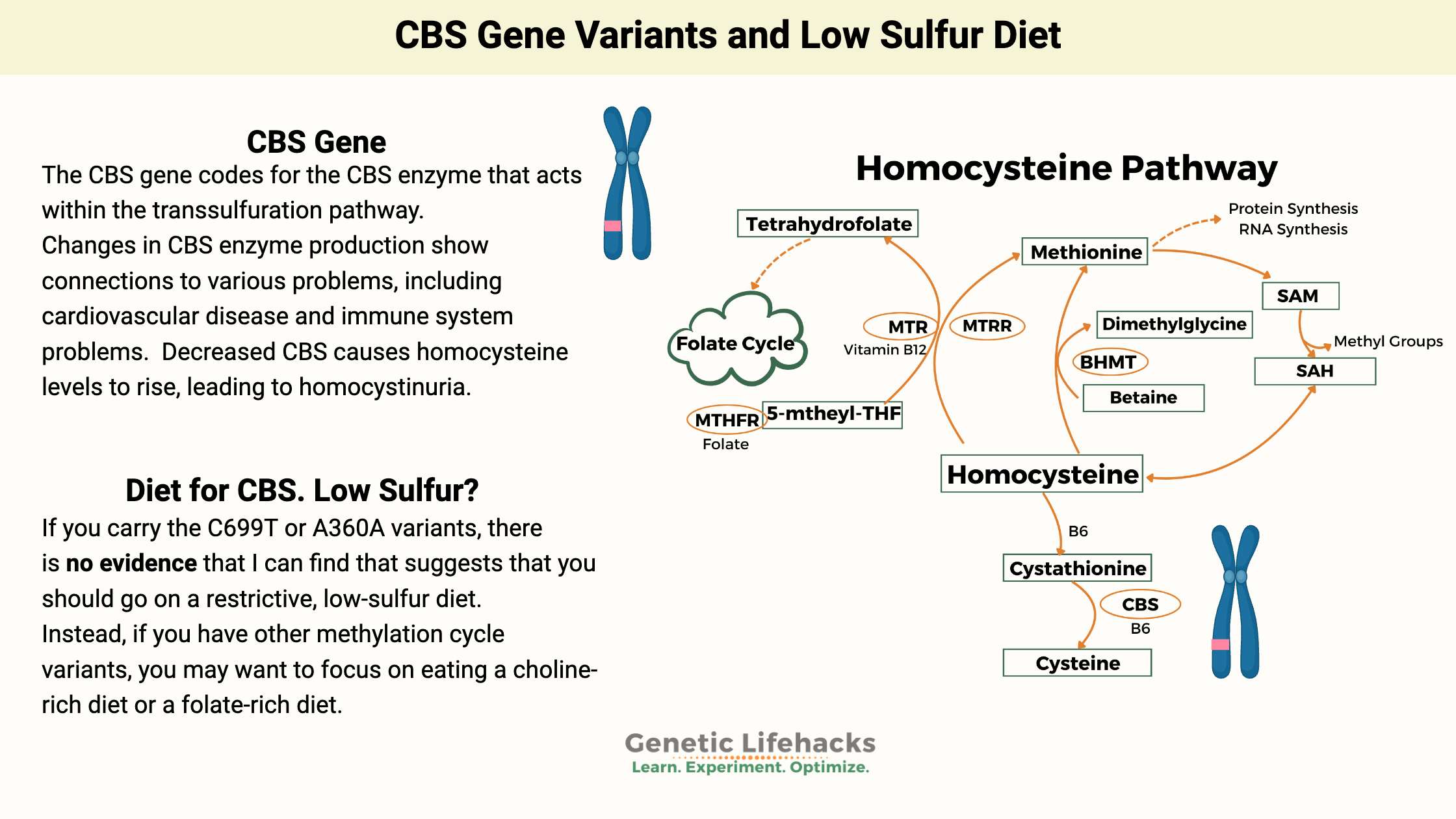Key takeaways:
~ The CBS gene impacts the transsulfuration pathway and influences homocysteine levels.
~ Despite a lot of popular advice promoting a low-sulfur diet for CBS variants, there isn’t much research that backs this up.
~ Studies show that CBS gene variants may have minimal effects on cholesterol and cleft lip risks.
~ One specific mutation in CBS is linked to high homocysteine levels, and vitamin B6 has been shown to help people with this variant. You can check your raw data for this in the genotype report.
CBS Gene: Does Research Show that You Should Eat a Low Sulfur Diet?
What is the CBS gene?
The CBS gene – cystathionine beta-synthase – codes for the CBS enzyme that acts within the transsulfuration pathway. The CBS enzyme reduces homocysteine to an intermediate (cysteine) that eventually can become glutathione, an important antioxidant in the body. Additionally, the CBS enzyme participates in a desulfation reaction to help create hydrogen sulfide, H2S. Hydrogen sulfide, a molecule needed by the body in just the right amount, at low levels, acts as a mitochondrial electron donor, but at high levels, it is poisonous to the mitochondria. Likewise, the importance of the body maintaining the right levels of homocysteine should not be understated because high levels of homocysteine are associated with heart disease.[ref]
Changes in CBS enzyme production show connections to various problems, including cardiovascular disease and immune system problems. Decreased CBS causes homocysteine levels to rise, leading to homocystinuria.
Something to note here: Vitamin B6 is a cofactor needed in the reaction that converts homocysteine.
What do online clinicians say about the CBS gene?
CBS is often mentioned on websites that discuss the methylation cycle, with speculation by a couple of well-known clinicians that some of the variants listed below up-regulate or increase the amount of the CBS enzyme.
Websites that discuss these clinicians’ ideas often caution against eating foods that contain sulfur (meat, garlic, eggs, etc.) with the variants and warn of too much ammonia.
Here are a few examples of what doctors are recommending (that I don’t find a lot of research to back up…):
- Dr. Jocker recommends a low sulfur diet: “The CBS mutation leads to excess taurine, ammonia and sulfur groups that are released into toxic sulfites in the body. If the individual is consuming large amounts of sulfur-containing foods it can lead to more sulfites and increased stress and inflammation”
- MTHFR Support’s recommendation to ‘fix’ CBS first: “There is still much more for me to learn but one thing I do know, is that CBS must be addressed before an MTHFR, MTRR and/or MTR protocol can be properly started…”
- Heartfixer site: “The CBS C677T and A360A genes code for enzyme function that is pathologically up-regulated. They are “always-on” above that called for by the presence of oxidative stress. Of the two, the C677T allele is the most important, producing enzyme activity that is 10-fold greater than normal. ” (Note there is no CBS C677T variant… )
However… these claims aren’t backed by much research.
Does this mean that those clinicians are wrong? I don’t know for sure. Perhaps they know more than the published research studies by geneticists. (OK, I’ll just state that the Heartfixer site likely is wrong. Perhaps a typo.)
What does the research actually show on the CBS variants?
Surprisingly, there isn’t much research on the CBS variants on which the clinicians above base their recommendations for a low-sulfur diet. There are a few peer-reviewed studies on the variants – but the studies don’t show that the CBS variants have much of an impact on health. I encourage you to read the research for yourself and see what you think.
The research on the variants:
- does not show these variants are a problem
- does not indicate that everyone with the variants should be on low-sulfur or low-protein diets
- does not show that people with the variants should shell out money for specific ammonia-reducing supplements
Instead, the research indicates that the common CBS variants may have a subtle effect on cholesterol levels. One of the variants slightly decreases the risk of having a baby with a cleft lip, which indicates a positive connection to the methylation cycle.[ref][ref]
CBS Genotype Report:
Lifehacks:
The most impactful variant above is the rs5742905 variant which increases the risk of high homocysteine.
When to test your homocysteine levels:
There is a well-researched connection between high homocysteine levels and an increased risk of heart disease as well as other health impacts. If you do have the variant and high homocysteine levels, the good news is that vitamin B6 is likely to help.
Related article: Homocysteine: research studies and genetic connections
If your data shows the rare rs5742905 G allele, you may want to get your homocysteine levels checked. Talk with your doctor about homocysteine risk factors and get them to order the test for you. Or, if you are in the US, you can order the test yourself through UltaLabs or other online lab test retailers. It’s a relatively inexpensive test.
Diet for CBS C699T or A360A:
Related Articles and Topics:
COMT: How to Optimize Your Supplements for Your COMT Genotype

